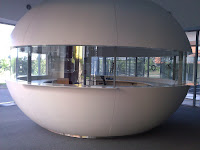This week marks the end of a month long series of overseas trips for the University. I have traveled over 30,000 miles, been on 15 different flights, 4 train journeys (each some three hours long) and two bus journeys (also 3 hours long) and taxi’s too many to mention – I am so fed up with doing taxi therapy. And for those wondering about cost - only the Council of Deans meeting was paid for by the University!
In any event, this week I spent three days in Martin, Slovakia at a nurse education conference that I have been supporting for some 18 years. It was held at the Comenius University, a University renowned for its programmes in both Slovak and English, particular those in the field of medicine.
The University is named after Jan Comenius a 17th century Czech teacher and philosopher…
… as a theologian, Comenius was viewed as a mystic, a believer in prophecies, dreams and revelations. His legacy was the influence he had in educational work. Despite the fact that few people since his day have had a greater influence on health care education, there is little recognition of his relationship to the current advances in educational thinking and practice. His contribution was far reaching. He was originally a teacher and a manager of schools, in Slovakia, Sweden and Holland. In his Didactica Magna (Great Didactic), he outlined a system of schools which today is the exact counterpart of the current American system of nursery, primary school, secondary school, college, and university system.
Comenius was influential in formulating a general theory of education. He was the first person to formulate that idea of ‘education according to nature’ so influential during the latter part of the eighteenth and early part of the nineteenth century. The influence of Comenius on educational thought is comparable with that of his contemporaries, Bacon and Descartes.
None of which compares with the friendships I have enjoyed with colleagues involved in the conference over the past 18 years. Alzbeta (who first introduced me to Slovakia in 1993), Darja, who has shared the stage with me since 1995, Martina who has provided the best hospitality ever over the last ten years, and Stephan – the wisest man I have ever come across.
And of course the trip was a good one, great to be part of a new wave of intellectual debate and discussion – and then there were the medical students from UCL. Do they know how to hold a discussion? Interestingly they had decided not to drink the same drink twice while they were in Bratislava – so by the time I met them they were in mellow mood. And they were so much fun. BUT I have decided that I will not go out and have a drink with medical students again. I had to take two aspirin in the morning, and it took me a while to get going.
This is the last Bank Holiday weekend for a while - and today is for my children, grand children and celebration.
This is the last Bank Holiday weekend for a while - and today is for my children, grand children and celebration.
























